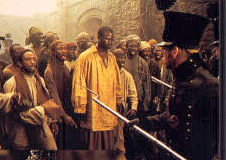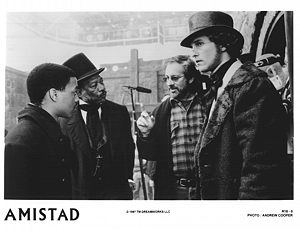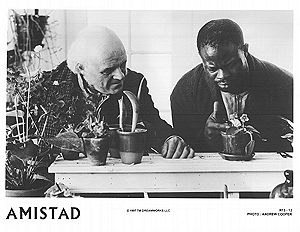click for new |
 |
| Festivale online magazine, February, 1998 |
 | Amistad |
| From the first lightning-filled moments of Amistad you know that the film makers know and love the language of their medium. In the dark bowels of a ship a man is but an animal grunting and crying as he picks away at his bonds with his bloody fingernails. Amid the clashing thunder, half-concealed by a storm, a bloody revolution takes place. It is, as we later see, outrage repaid with outrage, blood for blood, and pain for pain.
 | |
|
After Schindler's List, Spielberg has been trapped, once known for fluffy adventures and cardboard bad guys, he was elevated to meaningful, deep films. The history of humankind, fortunately for film makers, is filled with outrages that provide meat for serious story tellers. There is a kind of cyclic inevitability about his making a slavery-film. Slavery didn't begin or end with the African slaves in the United States, the legacy of slavery is still with us, in the 'whupping' punishment of children, and in the renaming of married women to show their change of ownership. Slavery, ownership, control, these are still issues that are with us today. Amistad disappointed me because it had the feel of uniqueness, not universality. It seemed to be something of our past, over, surmounted, not part of the human condition, not something that spoke of human behaviours that have no place in a healthy, intelligent, fair and just society, not something still to be conquered. |
 The photography is richly done, the story emphasises the noble savage as a man, not an ideal, however I wonder if the film audiences are quite so dense as to need their "Christ allusions" so plainly laid out for them. And yes, this is an interesting experience, watching a Jewish film maker drawing a parallel between black men kidnapped as slaves and a Jew made famous as a Christian martyr. The film makers claim that the incident threatened to bring the country closer to Civil War, and that didn't ring true. Sadly, film makers, unlike other story tellers are not required to give a bibliography, so we can't tell whether the major characters were, in real life, thinking that their actions could precipitate a war. The war was about the rights of individual states to self-determination, not about whether slavery was right or wrong. And somehow the mention of civil war watered down the issue of slavery. Amistad is one of those films that teachers will take their charges to (well, maybe not, there is some nudity reminiscent of Jaws). It's a film that is supposed to be good for you. I wonder if it is nourishing, or just didactic. |
| Ali Kayn see also: Tim's review For credits and official site details, click here. Search Festivale for more |
|
|
Like us on facebook |
 |
| Just the facts:
see Tim's Review |
|
Like us on facebook | No other uses are permitted without the prior written consent of owner. Use of the material in violation of the foregoing may result in civil and/or criminal penalties. Celebrate everything! www.festivale.info ISSN 1328-8008 Published in Melbourne, Victoria, Australia disclaimers | contact the editor | Festivale revision history  Published in Melbourne, Victoria, Australia Published in Melbourne, Victoria, Australia  copyright © Festivale 1998 All rights reserved copyright © Festivale 1998 All rights reservedFiled: 6-Feb-1998 Entire site refreshed: Dec 2008-Feb 2009 | Site URL transferred: Jan 2005 (previously www.festivale.webcentral.com.au) |
